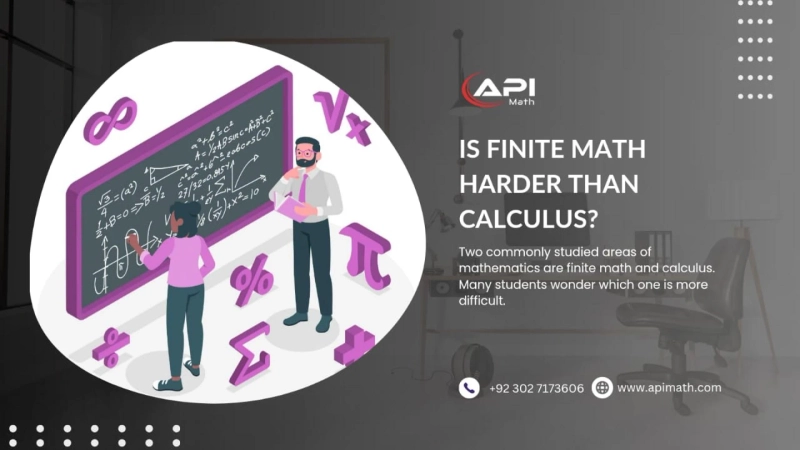Table of Contents
Introduction:What is Finite Math Equivalent to:Finite Math vs. Calculus:Differential calculus:Integral calculus:Is Finite Math Harder Than Calculus?Is Finite Math Harder than Algebra:Is Finite Math Harder than Statistics:What is Finite Math in High School:What is Finite Math in College:What is Finite Mathematics for Business:What is Finite Math Used For:What is Calculus Used For:Conclusion:FAQs:Is finite mathematics the same as calculus?Is finite math or calculus harder?Which math is harder than calculus?Can AI solve calculus?Does anyone use calculus in real life?Does anyone use Finite math in real life?Is Finite Math Harder Than Calculus?Post By : API MATHIntroduction:
The many subfields and subfields within mathematics provide their own distinct difficulties. Two commonly studied areas of mathematics are finite math and calculus. Many students wonder which one is more difficult. In this article, we will explore the differences between finite math and calculus, Is Finite Math Harder Than Calculus and delve into whether finite math is indeed harder than calculus.
What is Finite Math Equivalent to:
The term “finite math” is used to illustrate the branch of mathematics related with notions that can only have a finite number of solutions. The course content contains linear programming, graph theory, combinatorics, sets, and logic. Taking a course in finite mathematics is often the initial step for students wanting to major in computer science, engineering, or business.
SEE ALSO : Black and White Cool Math Game Fully Updated 2023
Finite Math vs. Calculus:
Finite math and calculus are two distinct branches of mathematics that approach problems from different perspectives. Finite math deals with discrete or finite concepts, focusing on countable and measurable quantities. Topics covered range from linear programming and graph theory to combinatorics and set theory.
Calculus, on the other hand, studies dynamical systems in which change, and motion are constants. Motion, growth, and decay are all examples of processes that may be analyzed and modelled using this paradigm. Calculus encompasses two main branches: differential calculus and integral calculus.
Differential calculus:
Limits, derivatives, and differential equations are the focus of differential calculus. Derivatives are effective tools for understanding the properties and behavior of functions because they compute the rate of change of a function at a specific moment in time. They are used to solve problems involving optimization, rates of change, and related rates.
Integral calculus:
Calculating definite and indefinite integrals, and the idea of integration, are at the heart of integral calculus. Integrals measure the accumulated change of a function over an interval and have applications in areas such as area under curves, volume calculations, and the calculation of averages.
SEE ALSO : Unit 5 SYSTEMS OF LINEAR EQUATIONS AND INEQUALITIES
Is Finite Math Harder Than Calculus?
Answer is No. In essence, calculus provides powerful tools and techniques for analyzing continuous change, while finite math deals with discrete and countable concepts. Both branches have their own set of principles, theorems, and problem-solving techniques.
Is Finite Math Harder than Algebra:
Finite math and algebra are distinct mathematical subjects that serve different purposes. In contrast to algebra, which is concerned with the manipulation of symbols and the study of equations and functions, finite mathematics is concerned with the exploration of discrete notions and problem-solving strategies. The relative complexity of the two is very relative to the skills and interests of the person doing the comparing.
SEE ALSO : I’ve done Calculus Course on Web Assign with 100% result
Is Finite Math Harder than Statistics:
Finite math and statistics are both branches of mathematics that have their own complexities. Finite math covers topics like probability, counting principles, and graph theory, while statistics deals with data collection, analysis, and interpretation. The difficulty between the two again depends on the individual’s aptitude for logical reasoning versus analytical skills.
What is Finite Math in High School:
Typically, a high school student will take a subject called “finite math,” which will expand their mathematical horizons beyond the bounds of algebra and geometry. Skills in logical reasoning, critical thinking, and problem solving are emphasized. Mathematical concepts such as sets, probabilities, statistics, matrices, and elementary logic may be covered.
What is Finite Math in College:
In college, finite math expands on the high school curriculum and provides a deeper understanding of discrete mathematics. It serves as a prerequisite or core requirement for various majors, such as computer science, engineering, and business. College-level finite math courses delve into advanced topics like graph theory, linear programming, and optimization.
What is Finite Mathematics for Business:
Finite mathematics plays a crucial role in the field of business. It equips students with quantitative skills necessary for analyzing financial data, making informed decisions, and solving optimization problems. Topics covered in finite mathematics for business often include linear programming, matrices, probability, and statistics.
What is Finite Math Used For:
Finite math has numerous applications across various disciplines. It is widely used in computer science for designing algorithms, analyzing networks, and cryptography. In engineering, finite math helps in optimization problems, graph theory applications, and project management. In business, it aids in financial analysis, forecasting, and decision-making processes.
What is Calculus Used For:
Calculus is a mathematical discipline that finds broad applications across various fields. It is essential in fields including as physics, engineering, economics, computer science, medicine, and more since it is used to examine and model continuous change and motion.
Calculus is used in physics to examine motion, forces, and energy, which in turn allows for the description and understanding of universal laws. Engineers rely on calculus to design and optimize structures, systems, and processes, analyzing complex phenomena such as fluid flow and structural mechanics.
Calculus is used in economics and finance for things like economic modeling, resource allocation optimization, and risk management. Algorithms, computer graphics, and machine learning all rely on calculus to solve problems and analyze data effectively.
As a mathematical foundation for understanding and predicting events involving continuous change, calculus also plays an important role in medical imaging, biological modeling, and other scientific disciplines. Calculus is useful in many different areas because it allows for exact analysis, modeling, and problem solving.
Conclusion:
Is Finite Math Harder Than Calculus?
From above overall discussion concluded that answer is no.
The contrast between finite mathematics and calculus demonstrates that these two areas of study are independent and present their own unique difficulties and practical needs. Finite math deals with discrete concepts, while calculus focuses on continuous change and motion.
The difficulty of one over the other is subjective and depends on individual strengths, interests, and goals. Finite math serves as a foundation for computer science, engineering, and business, while calculus finds widespread applications in physics, engineering, economics, and other scientific disciplines.
Both fields contribute valuable problem-solving techniques to different areas of study. Whether finite math is harder than calculus cannot be definitively determined, as it varies from person to person. Based on interests, career goals, and discipline needs, choose a math course. Finite math and calculus are essential to mathematics and help us understand the world.
FAQs:
Is finite mathematics the same as calculus?
No, finite mathematics and calculus are distinct branches of mathematics. Finite math deals with discrete concepts, while calculus focuses on continuous change and motion.
Is finite math or calculus harder?
Determining whether finite math or calculus is harder is subjective and depends on an individual’s strengths and preferences. Both subjects have their own unique challenges.
Which math is harder than calculus?
Mathematics encompasses various branches, each with its own complexities. Advanced topics such as abstract algebra, differential geometry, and complex analysis can be considered more challenging than calculus.
Can AI solve calculus?
Yes, AI can solve calculus problems. AI-powered systems can perform complex mathematical calculations and solve differential equations, making them valuable tools for calculus-related tasks.
Does anyone use calculus in real life?
Yes, calculus has numerous real-life applications. It is used in physics to describe motion and forces, in economics for analyzing supply and demand, in engineering for optimization problems, and in various scientific fields for modeling and analysis.
Does anyone use Finite math in real life?
Yes, finite math is used in various real-life applications. It’s useful in computing, engineering, business, ops research, cryptography, network analysis, and decision making, to name a few domains. Many problems in discrete structures, optimization, logic, and data analysis can be solved by applying notions from finite mathematics, such as set theory, probability, graph theory, and linear programming.
From designing efficient algorithms to analyzing networks and making data-driven decisions, the principles of finite math are valuable in solving real-world problems and improving processes in diverse industries.
Is Finite Math Harder Than Calculus?
So answer is No, Since calculus is more advanced than finite math.



